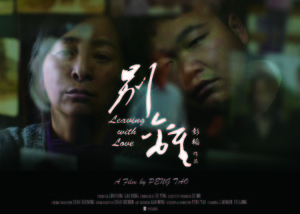Leaving with Love
别离
China, 2017, colour, 1.85:1, 89 mins.
Director: Peng Tao 彭韬.
Rating: 6/10.
Actress Li Qinqin gives dramatic heft to this indie portrait of a mother and her retarded son.
A hilly suburb on the outskirts of Beijing, the present day. The widowed Zhao Suzhen (Li Qinqqin) lives with her retarded son, Geng Dazong (Fei Long), and runs a small shop selling funerary offerings in town. One morning she collapses when opening the shop and is taken to hospital by a nearby friend; but that evening she goes home, claiming there’s nothing wrong with her. Geng Dazong has a fascination with anked flames of any sort, and after playing with fire again he is put in a sanatorium, as Zhao Suzhen needs to go into hospital for treatment. However, against her doctor’s advice, she checks herself out before the tests are even finished, as she misses not being with her son. Visiting him at the sanatorium, she finds him causing trouble and takes him home to care for him herself. She visits her elder son, Geng Dayong (Wang Yanjiang), who is married, lives in the northern suburbs and rarely visits her. He’s friendly, but he doesn’t comment when she asks him to take care of his younger half-brother in the event of her death. Zhao Suzhen also visits an old friend who used to be in the same pop group as her husband and who now runs a fading dancehall. They reminisce about happy times in the past. One afternoon, while in a park with Geng Dazong, Zhao Suzhen collapses in the toilet; when she returns outside, Geng Dazong has disappeared.
REVIEW
A quietly powerful performance by actress Li Qinqin 李勤勤 is the main reason to watch Leaving with Love 别离, the fifth feature by indie Mainland film-maker Peng Tao 彭韬 that continues his interest in exploring the emotional worlds of socially marginal characters. Like his last feature, Cremator 焚尸人 (2012), this one is slow to gather dramatic momentum, but the slimly-plotted tale – more like “scenes from the life” – of a mother and her retarded son benefits enormously from Peng using professional actors this time. Though Li carries the film, she’s complemented by a performance from actor Fei Long 肥龙 (“Fat Dragon”), as the overweight adult son, that’s both scarily realistic and finally very touching.
Peng’s previous four features have all dealt with characters on the edge of normal society: the widow and old man in the 1968-set Red Snow 红色雪 (2006), young street beggar in Little Moth 血蝉 (2007), gullible teenager from the countryside in Floating in Memory 流离 (2009), and cremator-cum-bodysnatcher who trades on popular superstition in Cremator. In Leaving, it’s a widow living in the outer suburbs of Beijing whose life revolves around her small shop (selling funerary objects) and her idiot son who’s always getting into trouble due to his fascination with fire. As she ignores her own health problems (and other people’s advice) out of an all-consuming duty to care for her offspring, she also starts to enter the same fantasy world as him. (The film’s Chinese title, literally “Don’t Leave”, underscores the pair’s mutual dependency.)
Beijing-born Li, 54, shot to notice with her first movie role as the teenage daughter in A Great Wall 北京故事 (1986), with later parts including the neighbour in Cala, My Dog 卡拉是条狗 (2003). More recently on the big screen she’s been enjoying a bonanza of meaty character roles: the eldest daughter in the bickering family in Crazy New Year’s Eve 一路惊喜 (2015), the brassy landlady in The Bodyguard 特工爷爷 (2016) and the anti-hero’s loopy mother in Wished 反转人生 (2016). In Leaving she’s utterly believable, without any exaggeration, as a stubborn old Beijinger who can’t see beyond her immediate universe. As her son, Fei Long (real name Wang He 王鹤), who’s made a career out of being a fattie (Buddha Mountain 观音山, 2010; No Liar, No Cry 不怕贼惦记, 2011; Flying with You 一起飞, 2012), comes through strongly as the film progresses, especially in the fantasy switches. Among the supports, Wang Yanjiang 王彦江 is briefly notable as the son’s half-brother who’s politely distanced himself from his family.
Though not a difficult sit, the film, like Cremator, doesn’t justify its length in terms of content: so much more could have been developed from the lead characters, as well as the supporting ones (a brief hint is given by a sequence in a dancehall), that it’s perhaps time for Peng to consider working with a co-writer in the future. A music score would also have made the film twice the emotional experience. Photography by Zhao Xuening 赵雪宁 is naturalistic and, apart from a handful of shots, unnuanced. Though it’s never specified exactly where the story is set, much of the shooting was in a hilly region northwest of Beijing, in Haidian district, beyond the Sixth Ring Road.
CREDITS
Presented by Beijing Kingdom of Film & TV Culture (CN), Heaven Pictures (Beijing) The Movie Company (CN).
Script: Peng Tao. Photography: Zhao Xuening. Editing: Peng Tao. Music: none. Song: Dafei. Art direction: Gao Ming. Sound: Zhao Suchen.
Cast: Li Qinqin (Zhao Suzhen), Fei Long (Geng Dazong), Xing Zhendong (Wang Quanfu), Ji Li (Tang), Wang Yanjiang (Geng Dayong), Shang Yansheng (Wan Langsha), Mai Airu (dancehall singer), Chen Meirong (Daxiang), Fu Shaoluan (third auntie), Zhang Shipeng (sixth uncle), Sun Yinuo (Xiaohui, Geng Dayong’s neighbour), Cai Yingchun (female customer in shop), Sun Wei (X-ray doctor), Huang Renzhao (man on bus), Liu Yijing (woman on bus).
Premiere: Shanghai Film Festival, 22 Jun 2017.
Release: China, tba.
